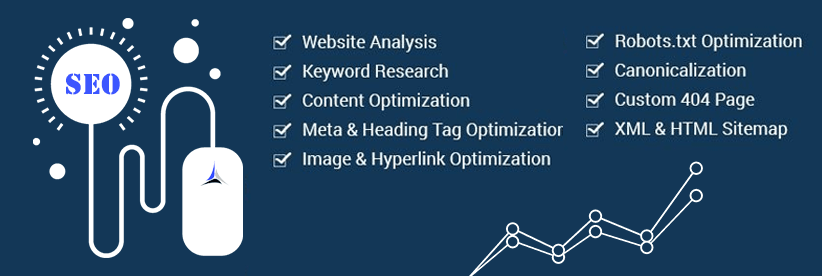Technical SEO
Technical SEO optimizes a website’s infrastructure for efficient crawling, indexing, and ranking by managing crawling, indexing, duplicate content, implementing XML sitemaps, and leveraging structured data and hreflang attributes.

Technical SEO Services
You’ve just built a fantastic website, and you’re eager for people to find it and explore your amazing content. But wait, something seems off your site isn’t showing up in search results as you hoped. That’s where technical SEO comes to the rescue!
It is like the behind-the-scenes magician that works wonders to boost your website’s visibility on search engines to make it more appealing.

Think of it this way
You’ve set up an amazing store with amazing products, but it’s situated away in a distant area where nobody can find it. Technical SEO is like putting up flashy signs, clearing the path, and making sure everyone knows about your store, so they come running to check out what you have to offer!
So, why is it so important? Well, it’s the key to unlocking the treasure trove of potential visitors for your website. When you optimize your site technically, search engines can easily find, understand, and show it to users searching for related topics.
But what exactly does technical SEO involve?
Let’s break it down into the essentials:
Technical SEO: What is it?
Intending to improve organic rankings and server optimizations that make your site simpler for crawlers and website users to comprehend and operate, it is a set of website optimizations.
These optimizations comply with the technical standards of contemporary search engines. Due to your great user experience (UX) and high-calibre content, its optimisation can help your company rank better in search results.
Why is technical SEO so crucial?
It is crucial since it ensures your website is user-friendly, indexable, and crawlable. This implies that users can locate what they’re seeking for when they land on your pages and that search engines can comprehend your website.
Let’s dive into the world of technical SEO and explore the 16 essential types that can transform your website:
- Website Speed and Performance Optimization: This involves making your website lightning-fast by optimizing its code, images, and other elements. A speedy website impresses both users and search engines.
- Mobile-Friendly and Responsive Design: Ensure your website adapts perfectly to various devices like smartphones and tablets. A mobile-friendly site keeps your visitors happy and engaged.
- Website Architecture and URL Structure: Organize your website in a logical manner and create clear URLs that lead to related content. A well-organized website is simple to use and comprehend.
- XML Sitemaps and Robots.txt Optimization: Help search engines find and explore your website effectively by providing XML sitemaps and instructing them with Robots.txt.
- Canonicalization and Duplicate Content Management: Avoid confusing search engines by ensuring each page has a unique URL. Eliminate duplicate content to maintain consistency and authority.
- Redirects and URL Redirect Chains: Ensure seamless user experiences by setting up proper redirects when you change a page’s URL. Avoid redirect chains to prevent users from getting lost.
- Structured Data Markup: Enhance your search engine results with additional information using structured data markup. It can lead to eye-catching snippets and more clicks.
- SSL Certificate and HTTPS Implementation: Secure your website with an SSL certificate, encrypting data transmitted between users and your site. This builds trust and credibility.
- HTML and XML Sitemap Optimization: Create well-structured HTML and XML sitemaps to guide search engines in discovering and indexing your content accurately.
- HTML and CSS Optimization: Optimize your website’s code to reduce its size and improve loading times. A faster website delights both users and search engines.
- Site Crawlability and Indexability: Ensure that search engines can easily crawl and index your website’s pages. It helps them understand your content better.
- Server and Hosting Configuration: Choose a reliable hosting provider and configure your server settings for optimal performance. A stable server ensures your website runs smoothly.
- Page Load Speed Optimization: Speed up your page load times to keep visitors engaged and encourage them to explore more.
- Error Page Management (404, 301, etc.): Customize error pages for various errors like 404 (page not found) and 301 (page moved). Provide helpful guidance to users when they encounter errors.
- Image Optimization: Optimize your images to reduce their file size without compromising quality. This ensures faster loading and better user experience.
- Schema Markup Implementation: To give search engines additional information about your content, use schema markup. It can lead to enhanced rich snippets in search results.
Master these aspects to improve your website’s ranking in search results and deliver a fantastic user experience to your visitors. Happy optimizing!
Let’s explore the fantastic benefits of technical SEO for your website
- Improved Rankings: It ensures your website meets search engine requirements, which can boost your rankings in search results. When you rank higher, more people can find your website easily.
- Increased Traffic: With better rankings, your website becomes more visible to potential visitors. This means more people will click on your site, leading to increased traffic.
- Better User Experience: When you optimize your website technically, it becomes user-friendly and easy to navigate. This activity encourages visitors to stay more on the website and explore it for longer.
- Reduced Bounce Rate: A high bounce rate indicates that visitors quickly leave your site without taking any action. Technical SEO helps create a user-friendly website, reducing bounce rates and keeping visitors engaged.
By embracing the benefits listed, you’ll not only climb higher in search results but also attract more visitors who will enjoy a seamless and satisfying experience on your website.
Here are some essential technical SEO factors you should know about
- Crawling and Indexing: Search engines need to explore and understand your website to show it in search results. Technical SEO ensures your site is easy for search engines to crawl and index.
- Website Page Speed: A fast-loading website is more likely to rank higher in search results. Technical SEO can boost your page speed by optimizing images, streamlining code, and using a Content Delivery Network (CDN).
- Mobile Optimization: It’s crucial to have a mobile-friendly website as more people use mobile devices for web searches. Technical SEO ensures your site looks great and functions well on smartphones and tablets.
- Security: Building trust with your visitors is essential. Technical SEO improves your website’s security by implementing HTTPS and other protective measures, making your site more trustworthy.
By focusing on these essential factors, you can ensure that your website loads quickly and is well-optimized for search engines.
Improving your website’s technical SEO is essential for better search engine performance.
Here are some important steps you can take
- Optimize your website for speed: To make your website load faster, use a content delivery network (CDN) that serves your content from nearby servers, minify your code to reduce its size, and compress images without losing quality.
- Ensure your website is crawlable: Avoid duplicate content on your site and use clear, concise URLs that make it easy for search engines to navigate. Also, check for any errors in your robots.txt file.
- Submit your website to search engines: After optimizing your technical SEO, submit your website to search engines like Google. This ensures they find and index your site, making it visible in search results.
Here are some extra tricks to enhance your website’s technical SEO and boost its visibility in search results
- Choose a trust-worthy web hosting provider that offers great performance and uptime.
- Keep your website’s code updated and free from errors to ensure smooth operation.
- Utilize a CDN (Content Delivery Network) to serve content from servers near your website visitors, speeding up page loading times.
- Minimize your website’s code to make it smaller and load faster.
- Compress images on your website to reduce their file size without compromising quality.
- Use clear and straightforward URLs that search engines can easily understand and index.
- Avoid having duplicate content on your website, as it can confuse search engines.
- Regularly submit your website to search engines to ensure they are aware of your content and can rank it appropriately.
By applying these simple yet effective techniques, your website’s technical SEO will be optimized, helping it rank higher and attract more relevant traffic.
Here are some more technical SEO topics that you might find interesting to explore
- Web Accessibility: Web accessibility involves making websites easy to use for people with disabilities. It’s not only an ethical consideration but also impacts SEO.
- Security: Search engines prefer secure websites, so ensure your website uses HTTPS and has robust security measures in place.
- Internationalization: If you want your website to reach a global audience, make it international-friendly. This can be done by offering content in multiple languages and optimizing it for different countries.
Frequently Asked Questions
- Ignoring mobile optimization
- Slow page load times
- Duplicate content
- Broken links and redirects
- Missing or incorrect XML sitemaps
- Poor website architecture and URL structure
- Not using HTTPS for secure connections
- Not optimizing images for web
- Over looking meta tags and descriptions
- Ignoring website crawlability and indexability.
Trial versions or free plans can also help you assess if the tool meets your requirements before making a final decision.
Digital Marketing - News & Updates
Read the latest SEO and marketing market news and the latest news about us.
